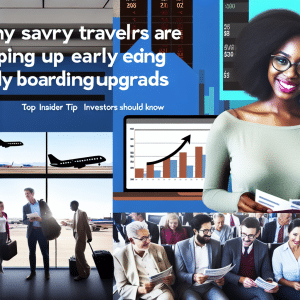Southwest Airlines’ Boarding Shake-Up: What It Means for Travelers and Investors Alike
In a landmark shift that signals a broader industry trend, Southwest Airlines—long celebrated for its no-assigned-seats, first-come-first-served boarding style—is officially entering the era of assigned seating and structured boarding groups starting late January 2024. This move aligns Southwest with other major carriers and introduces new dynamics for both travelers and investors to consider.
Why This Change Matters Beyond the Airport Gate
Southwest’s decision isn’t just a tweak in passenger convenience; it reflects the airline’s strategic pivot toward revenue optimization and operational efficiency. Historically, Southwest’s open seating policy was part of its brand identity, fostering loyalty among budget-conscious flyers. However, the rising demand for personalized travel experiences, coupled with the competitive pressure to monetize ancillary services, has pushed the airline to adopt a boarding model that encourages passengers to pay for upgrades like early boarding.
From an investment perspective, this shift signals Southwest’s intent to enhance ancillary revenue streams—a critical growth area as ticket prices face downward pressure in a highly competitive market. According to a 2023 report by Airlines for America, ancillary revenues now account for over 15% of total airline income industry-wide, up from just 7% a decade ago. Southwest’s move could boost its profitability, making it a more attractive stock for investors focused on sustainable growth.
What Travelers Need to Know: The Overhead Bin Race Is Real
Industry experts like Sara Wilcox from Fora Travel and Henry Harteveldt of Atmosphere Research Group emphasize that the prime motivation behind purchasing early boarding is securing overhead bin space for carry-ons. This seemingly small convenience has become a major battleground in the post-pandemic travel world, where passengers increasingly prefer to avoid checked baggage fees and delays at baggage claim.
For travelers, this means weighing the cost-benefit of early boarding add-ons, which vary by airline. For example, United Airlines charges a flat $24 for priority boarding, while Southwest’s newly introduced fees are expected to be competitive but could vary by route and demand.
Strategic Moves for Investors and Advisors
-
Monitor Ancillary Revenue Trends: Investors should watch Southwest’s quarterly earnings for signs of increased ancillary revenue contribution. A successful rollout of assigned seating and boarding fees could set a precedent for other low-cost carriers, potentially reshaping the industry’s revenue landscape.
-
Evaluate Airline Loyalty Programs: Travel credit cards linked to airlines, such as those from American Airlines and Delta, often include priority boarding perks. Investors might consider the impact of these programs on customer retention and spending patterns, as well as the credit card issuers who benefit from co-branded partnerships.
-
Advise Clients on Travel Spending: Financial advisors should counsel clients to evaluate the true value of early boarding and seat selection fees. For frequent flyers, investing in an airline’s travel credit card or elite status could yield significant savings and convenience, but occasional travelers might find these add-ons less cost-effective.
What’s Next? The Boarding Experience as a Revenue Frontier
Southwest’s boarding overhaul is just the beginning. Airlines are increasingly experimenting with dynamic pricing models—charging passengers based on demand, flight length, and even time of booking for services like seat selection and priority boarding. This trend aligns with broader shifts in consumer behavior where personalization and convenience command premium prices.
A unique insight from UpgradedPoints editor Stella Shon underscores a subtle but important point: while upgrading with points or miles can offer value, cash upgrades often deliver the highest return on investment. This nuance is critical for travelers maximizing loyalty programs and for advisors guiding clients on travel rewards strategies.
A Real-World Example: Delta’s Dynamic Boarding Fees
Delta Air Lines has been a pioneer in this space, implementing variable fees for preferred seating and early boarding. In 2023, the airline reported a 12% increase in ancillary revenue attributed to these services, according to its investor relations data. Southwest’s adoption of similar models could replicate this success, making it a bellwether for the industry.
Actionable Advice for Investors and Travelers:
- Investors: Keep a close eye on ancillary revenue disclosures in airline earnings reports. Southwest’s transition offers a unique opportunity to evaluate how legacy low-cost carriers adapt to evolving revenue models.
- Travelers: Before booking, assess whether early boarding or seat selection add-ons align with your travel habits. Consider airline credit cards that bundle these perks to maximize value.
- Advisors: Incorporate travel spending and rewards optimization into client financial plans, especially for those who travel frequently for business or leisure.
Southwest’s boarding revolution is more than a policy change—it’s a signpost pointing to the future of air travel economics. For those ready to navigate this new terrain, the rewards could be substantial, both in the air and in the market.
Sources:
- Airlines for America, 2023 Ancillary Revenue Report
- Delta Air Lines Investor Relations, 2023 Earnings Data
- Skyscanner Travel Insights
- UpgradedPoints Travel Advisory
Source: The ‘No. 1 reason’ to buy the early boarding upgrade: travel expert

